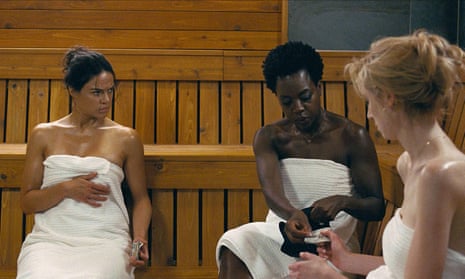Anticipation is high for Widows, the new film from British director Steve McQueen, which opened the BFI London film festival on Wednesday. Not only is it a new release from one of the UK’s most renowned film-makers, but it is the latest pitch for box office and awards success by a new breed of film production companies – or “content providers”, as they now term themselves.
See-Saw Films, the company behind Widows, was founded in 2008 by Iain Canning and Emile Sherman. It has made awards-friendly dramas such as The Kings Speech and Lion, TV series such as Top of the Lake, music videos for Kanye West and the Netflix fantasy show The New Legends of Monkey. Widows, however, is a big step up in scale and budget for McQueen, Canning and Sherman, who are releasing the heist movie in the wake of a string of successes in the prestige art-film sector.
See-Saw hit the jackpot in 2010 with The King’s Speech, which, with worldwide earnings of $410m (£316m), remains the best performing British independent film of all time, and won four Oscars, including best picture. In the years since, Canning and Sherman have successfully merged their cultural perspectives (Canning is British, Sherman is Australian) in films such as Lion, which put British-Asian actor Dev Patel in a story about a lost Indian boy adopted by an Australian family, and the recent Macbeth, shot by Australian director Justin Kurzel.
Having received its world premiere in Toronto last month, Widows is McQueen’s first feature since the multi-Oscar-winning 12 Years a Slave, released in 2013. It is likely to reach a far larger audience than the uncompromising, harrowing dramas in which he has so far specialised. It is a reworking of the celebrated 1980s ITV series of the same name written by Lynda La Plante, about a group of women who organise a heist after their robber husbands are killed in a raid. With Viola Davis, Michelle Rodriguez and Elizabeth Debicki in the lead roles, Widows is pitched as a heist movie for the #MeToo era.
See-Saw have history with McQueen, having signed up his second feature, the sex-addiction study Shame. McQueen and Canning had met when the latter worked in an executive role on his first film, the IRA-protest drama Hunger. Widows, however, is a different beast. “It was a bigger-budget concept,” says Canning. “A bigger canvas, but still going to say something about the world. It’s allowed us to play on a different field.” In an illustration of how film-making cross-pollination can assist producers as well as directors, See-Saw were able to benefit from McQueen’s connection with Arnon Milchan’s Hollywood powerhouse production outfit Regency, which had backed 12 Years a Slave. “Production went so well on Widows that we ended up signing a deal with Regency to make bigger-budget genre films.”
Sherman and Canning say their strategy has been to build a stable of film-makers. Aside from McQueen, they have longterm relationships with Lion director Garth Davis, Jane Campion (with whom they have made two series of crime drama Top of the Lake), and Scottish musician and director John Maclean, who is working on a follow-up to the Michael Fassbender western Slow West.
The pair are optimistic about the future of the much-lamented mid-budget-range film – titles costing up to £30m. Some industry observers believe the format has been consigned to the dustbin by a Hollywood obsessed with tentpole franchises. But, “it all comes down to audience,” says Canning. “It’s a miracle any films get made at all, and then to make sure the alchemy comes together so they are successful is another challenge. We’re in a really interesting stage in the US with films that capture a zeitgeist, a moment, whether that be something like Moonlight or Lady Bird. There’s still life at these budget levels, but undoubtedly it’s a hard fight for the audiences.”

The financial environment in which See-Saw operates is tough. Turnover for the London and Sydney-based group in 2017 was approximately AUS$18m (£9.7m), buoyed by the success of Lion and Top of the Lake. In 2018, it dropped to approximately AUS$8m, with next year’s results expected to be similar. Figures supplied by the BFI for British films demonstrate the squeeze on mid-budget films. In 2017, 99 films qualified in this range, a slight rise on 87 for the previous year. However, UK big budget productions (over £30m) almost doubled, to 24, while low-budget films swamped them, at 160 (a slight drop from 2016, when there were 169). See-Saw say they cannot disclose Widows’ budget, but it is clear the company is now looking to break into the bigger financial league.
See-Saw has also had to grapple with other dramatic changes in the film and TV businesses over the past decade. When they started out, Sherman says, “we thought we’d be doing primarily Australian and UK films”, but with the inexorable rise of high-end TV, however, he says their aim is to “make incredible content”, whatever the medium. “When an idea is brought to us, part of our job is to think: what is the best format?”
Their first attempt in TV – Campion’s Top of the Lake – helped establish the artistic parity of film and TV, after it was given prestigious screening space at the Sundance and Berlin film festivals. The second series, Top of the Lake: China Girl, was screened it its entirety at the even more sniffy Cannes film festival.
“Television offers an incredible longform experience, like a novel,” says Sherman. “But there’s also something special about the two-hour format. Television has raised the game in drama to such a degree that for something to be theatrically released it has to be a really compelling proposition – for people to pay babysitters and get out of the house. It has to be a worthwhile cinematic experience – that’s a great challenge as a producer and I guess that’s what gets us out of bed in the morning.”
